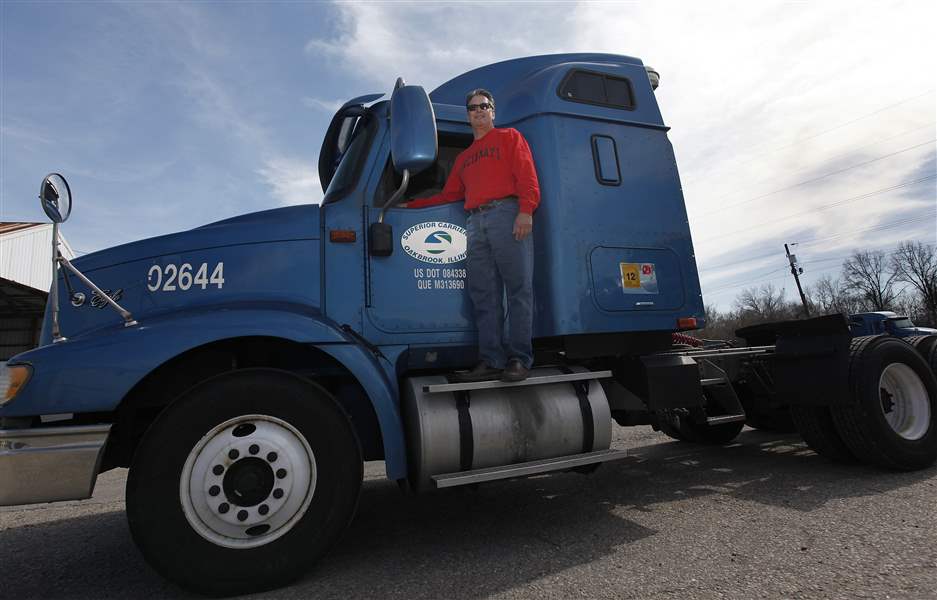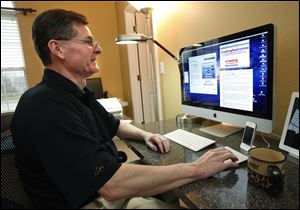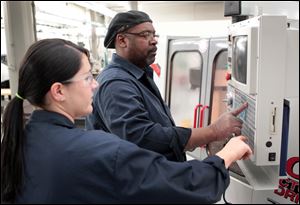
Older Ohioans pursue multiple strategies
Unemployed retool, retrain, revise outlooks
Those who find new jobs often accept lower pay
3/26/2012
David McCarty of Butler County’s West Chester Township refocused his search and completed training to drive big rigs. Now, he spends up to six days a week hauling 50,000 pounds of hazardous materials, mostly animal fats, across the country.
cincinnati enquirer/amanda davidson
Second of three parts

Eric Russell, 52, holder of an engineering degree from UT, pursues his job search from the command center he set up in his Sylvania home. He recently completed a master’s degree in organizational development from BGSU.
CINCINNATI — In Cincinnati, 55-year-old David McCarty feels fortunate to be hauling hazardous chemicals cross-country in an 18-wheeler. But the work and pay are far removed from the life he used to have as a well-paid telecom executive.
In Cleveland, 56-year-old Warren James lost his manufacturing job after three decades of hard work. Now, the father of two is retooling — learning advanced manufacturing from instructors half his age.
And outside Toledo, 52-year-old Eric Russell has spent four years trying to land a new job. Despite construction experience, an engineering degree, his own Web site, and a 15-minute video he created for prospective employers, he still gets turned down.
For tens of thousands of Ohio baby boomers, the recession has delivered the big bust. Once unemployed, the state’s oldest workers take longest to be rehired. In early February, half of those claiming unemployment benefits for 74 weeks or longer were age 45 to 64.
Now, instead of easing into retirement, boomers are drawing down savings and starting all over. Instead of paying for their children’s college, they’re competing with young people for jobs. Instead of being valued for their experience, they’re having to learn new skills in hopes of simply keeping up.
If they’re lucky, the jobless weeks won’t last too long. But for many, the relief is new work at half the pay and few of the old benefits. Others simply give up the fight.
RELATED: JOBLESS BOOMERS IN OHIO STRUGGLE TO REGAIN FOOTHOLD
JOB CHANGE IN RECESSION HARD FOR OLDER WORKERS
Almost two years after the recession’s end in June, 2009, boomers are still feeling the squeeze.
It’s evident at the Hyde Park Community Methodist Church in Cincinnati, where hundreds of boomers meet weekly to tap into resources of the Job Search Focus Group, a professional networking organization.

Warren James of Cleveland, who formerly ran multimillion-dollar equipment at specialty metals companies, is training to operate computer-programmed tools used in almost every manufacturing plant in the country.
They share their resumes and decades of work experience with the crowd. The lineup is proof that the recession left no job sector unscathed.
“Every week I see people come in here and come to the realization that they are not a loser,” said Bob Pautke, president of the group. “There are very qualified and very talented candidates. And the fact is there are a lot of other people out there who are in their position.”
For the long-term unemployed, there are levels of low, David McCarty said.
There’s self-pity that leaves the question: Why is this happening to me?
There’s self-doubt that creeps in after being rejected by yet another employer.
And then there’s that place, somewhere near the bottom, when a job is such a necessity that the unemployed person ends up taking one that leaves him deeper in the hole than when he started.
“It’s a vicious cycle,” said Mr. McCarty, 55, a resident of Butler County’s West Chester Township, a Cincinnati suburb, who spent nearly 20 years in the telecommunications industry before losing his job in 2004.
During his career, he had risen through the ranks, working in executive positions with major long-distance providers. He even helped launch one of the first prepaid-phone-card companies.
But with a resume that touted vice president positions and hefty salaries, Mr. McCarty found his job search to be tougher than expected.
“It was almost comical the jobs I got turned away from. I couldn’t even get a job as a telecommunications service rep with Cincinnati Bell,” he said. “People just said, ‘you’re overqualified.’”
A string of commission-only positions, ranging from consulting work to selling office equipment, turned out to be worse. He had to dig into his own wallet for work and travel expenses.
“I went from making a six-figure salary at one time to nothing in two years,” Mr. McCarty said.
Then his wife, Mary, was given a diagnosis of rheumatoid arthritis in 2009. The family had no health insurance and little left in savings. They lost their home 10 days before Christmas in 2010.
The family packed up and moved into a rented condominium where they still live. Mr. McCarty went into survivor mode.
“You do what you have to, to get by each day. Then you can begin recovering,” he said.
Rather than continue to hunt for a job that leveraged his experience as an executive, Mr. McCarty decided to refocus his search.
He had seen the signs numerous times, posted on the sides of tractor-trailer rigs: Drivers needed.
After a few months’ training, he had his commercial driver’s license and a completely new career.
Now, he spends up to six days a week in a big rig hauling 50,000 pounds of hazardous materials, mostly animal fats, across the country. Every penny that comes in is accounted for.
“I don’t love driving a truck, but there are trucking jobs available,” Mr. McCarty said.
Through all the strife, he hasn’t lost his optimism. In his limited free time, he works on a handful of retail-based Web sites he created that he hopes take off. Among them is collegefootballfanstore.com that sell an assortment of NCAA school gear.
“I’m not giving up,” he said. “I still plan on winning this fight. If I can drive a truck and survive what we’ve been through, I can do darn near anything.”
Letting go of the past
The instructor in the shop looks younger than Warren James’ teenage daughter.
Mr. James spent more than half his life working with specialty metals, running multimillion-dollar equipment.
Now, at 56, the Cleveland resident is without a job and is back in school, learning advanced manufacturing alongside teenagers.
“I would have topped out at about $27 [an hour] and change. I had 30 days of vacation. They had a good 401(k) program,” said Mr. James, an employee of CSM Industries from 1977 to 2009. “It was a good job. I was making decent money.”
After losing his job, he invested his severance pay in a carpentry business that he eventually took a loss on.
Despite his 30-plus years in manufacturing, all he could find was temporary work — a few months at one job, a few days at another.
On top of that, his wife, Annette, had to take a pay cut.
He began to lose his footing.
Bills piled up, and the family lost their home to foreclosure.

David McCarty of Butler County’s West Chester Township refocused his search and completed training to drive big rigs. Now, he spends up to six days a week hauling 50,000 pounds of hazardous materials, mostly animal fats, across the country.
Mr. James knew that the skills he used in his former job weren’t going to help him find his next job.
So now he’s taking classes at Cuyahoga Community College’s Unified Technology Center, learning how to run CNC machines.
The computer-programmed tools are used in almost every manufacturing plant in the country.
He hopes to have earned certifications for operating and programming the tools by next month.
Already, Mr. James has landed a few interviews and assurances from companies that they need skilled CNC people.
He said he’s confident that he won’t be unemployed much longer.
“I don’t really view losing the job as such a bad thing. Now, I feel like I have another career, and I have an opportunity to do something I really wanted to do,” he said.
Focus, optimism
Eric Russell, 52, has built a command center at home dedicated to one purpose: getting himself back to work.
It all revolves around a whiteboard with commands, messages, and reminders for himself.
“I worked in the construction industry, and I bought into a business, and that didn’t work out,” said Mr. Russell, a resident of Sylvania. “I thought in 2006 I could go back to the construction industry.”
But that’s when construction took a turn for the worst, and Mr. Russell went back to school.
He had an engineering degree from the University of Toledo.
So he followed the experts’ advice and determined to get trained in something new. He recently completed a master’s degree in organizational development from Bowling Green State University.
ORIENTATION SET
Experience Works, a group that helps older job seekers, is to be host for an orientation at The Source on Friday from 10 a.m. until 2 p.m. Registration is scheduled from 9 a.m. until 9:45 a.m.
This program provides short-term skill training, job-search training, and assistance and supportive services for unemployed or underemployed job seekers ages 50 to 62.
The emphasis is on veterans and minority job seekers who can quickly take advantage of the short-term training opportunities and find employment.
Various educational and training providers have been invited to give overviews of their services and to be on hand to answer any questions job seekers may have. This is not a job fair; no employers will be present.
More information is available from Experience Works at 419-255-0764.
So far, it hasn’t helped, and Mr. Russell said he knows why.
“I just recently had a great phone call with a recruiter that put everything in perspective for me,” he said. “What I learned is that people can ask for exactly what they want in a candidate … right down to left-handed or right-handed.”
Mr. Russell has his own Web site, complete with an impressive resume and a 15-minute video to replace the initial telephone interview for employers.
He’s well aware that he’s competing with younger applicants who won’t ask as much in salary or health care.
A widower with no children, Mr. Russell has minimized his own expenses and stretches out every dollar. But he is anything but downtrodden or frustrated.
In 2011, he sent out 34 applications.
“I relaunched my job search last September, and what I am finding now is all kinds of reasons that I need to start my own consulting work,” he said.
Networking
Each Monday, job hunters at Cincinnati’s Job Search Focus are armed with a long list of tips for networking, interviewing, and coping.
“Volunteer work is the best form of networking,” Bob Pautke told a recent crowd. “It shows people your character and work ethic.”
He said too often the unemployed let embarrassment, pride, and grief get in the way of an honest job hunt.
“People do have to go through a grieving period; it’s natural,” he said. “But really, it’s best to get through it, and get on with it.”
It’s not entirely surprising that the 45-and-up crowd are having a tough time landing jobs, Mr. Pautke says.
“For decades, U.S. workers operated on unwritten rules that as long as they remained loyal to a company they were guaranteed a job,” he said. “That was really never an honest deal.”
Some experts say the problem is rooted in age discrimination by employers looking for cheaper, often younger workers.
Others cite older workers who didn’t stay on top of their skills, Mr. Pautke said.
“There is truth on both parts,” he said. “At the end of the day, the real question comes down to ‘what do you have to offer?’ I tell everyone who comes through here, no matter your age — you have to find the value that you offer an employer and go with it.”
Blade staff writer Ignazio Messina and Robert Schoenberger, a staff writer at the (Cleveland) Plain Dealer, contributed to this report.